- Home
- Nevil Shute
The Far Country
The Far Country Read online
Table of Contents
Cover
Title Page
Chapter One
Chapter Two
Chapter Three
Chapter Four
Chapter Five
Chapter Six
Chapter Seven
Chapter Eight
Chapter Nine
Chapter Ten
Chapter Eleven
Copyright
One
TIM ARCHER got into the utility and drove it from the Banbury Feed and General Supply Pty. Ltd., down the main street of the town. The car was a 1946 Chevrolet, somewhat battered by four years of station use, a sturdy practical vehicle with a coupé front seat and an open truck body behind. In this rear portion he was carrying a forty-four-gallon drum of Diesel oil, four reels of barbed wire, a can of kerosene, a sack of potatoes, a coil of new sisal rope, a carton of groceries, and a miscellaneous assortment of spades and jacks and chains that seldom left the truck. He drove down the long tree-shaded main street, broad as Whitehall and lined with wooden stores and bungalows widely spaced, and stopped at the post office.
He was a lad of twenty-two with a broad, guileless face, with yellow hair and blue eyes, and a fair, bronzed skin. He thought and moved rather slowly; if you disliked the Victorian countryside you would have said that he looked rather like a sheep, one of the sheep he spent his life in tending. His father had escaped from country life to Melbourne at an early age and had become a solicitor; Tim Archer had been sent to Melbourne Grammar School. In turn, he had escaped from city life when he was seventeen, and he had gone to learn the business of sheep upon a station at Wodonga in the north part of the state. Now he was working for Jack Dorman on a property called Leonora, twelve miles out from Banbury, and near a place called Merrijig. Leonora was hardly to be classed as a sheep station, being only eighteen hundred acres, and Merrijig was hardly to be classed as a place, being only a school and a little wooden pub and a bridge over the river. He had been at Leonora for three years, largely because he was in love in a slow, patient manner with the youngest daughter of the house, Angela Dorman. He did not see much of her because she was away at Melbourne University taking Social Studies. He wrote to her from time to time, simple, rather laboured letters about lambing and floods and bush fires and horses. She answered about one in three of these letters, because the country bored her stiff.
He got out of the utility, a big young man dressed in a check shirt open at the neck, a pair of soiled blue canvas working trousers stained and dirty from the saddle, and heavy country boots. He went into the post office and said to the girl at the counter, “I’ll take the letters for Leonora.” The mail delivery would not reach the station till late afternoon.
The girl said, “Morning, Tim.” She handed him a bundle from the stacked table behind her. “Going to the dance on Saturday?”
“I dunno,” he said. “I haven’t got a partner.”
“Go on,” she chaffed him. “You don’t need a partner. There’ll be more girls there than men.”
“Where have all the girls sprung up from?”
“I don’t know,” she said idly. “There seem to be a lot of girls about the town just now. Mostly New Australians. They’ve got two new girls at the hospital—ward-maids. Lithuanians they are, I think.”
“I don’t speak Lithuanian,” the young man said. “Aussie’s good enough for me—Aussie or English. Like cartridges for a twenty-two. The continental stuff’s no good.” He shuffled through the letters, looking for the one that was not there. “That all there are? Nothing for me?”
“Not unless it’s there,” she said with a touch of sympathy. “That’s all there were for Leonora.”
“Okay.” He stood in silence for a moment while his mind changed topic. “I’ll have to see about the dance,” he said. “I don’t know that I’ll be able to get in.”
“Come if you can,” she said. “There’s one or two Aussie girls’ll be there, in among the New Australians.” He smiled slowly. “They’re having favours—paper caps, balloons, and all that.”
“I’ll have to see what Jack says. He may be using the utility.” He turned to go. “ ’Bye.”
He went out and got into the utility and drove out of the town upon the road to Merrijig that led on to the lumber camps up at Lamirra in the forests of Mount Buller. It was October, and the spring sun was warm as he drove, but the grass was still bright green and the upland pastures were fresh and beautiful. There were wattle trees in flower still, great splashes of yellow colour on the darker background of the gum-tree forests, and the gum trees themselves were touched with the reddish brown of the young shoots, making them look a little like an English wood in autumn. Tim Archer did not fully realise the beauty of the scene, the wide sunny pastures and the woods that merged into the blue mountains to the south and east, because this was where he lived and worked and scenery like that was normal to his life. He only knew that this was where he liked to be, far better than the town.
He was depressed as he drove out of town because he hadn’t had a letter from Angela, as he had so often been depressed before. He was sufficiently intelligent to know that his chance of getting Angela was slender, because she liked town life and hated the country, while he was exactly the reverse. He comforted himself with the opinion that all girls were like that when they were young; they talked big about getting a job in Melbourne and doing interior decoration and going on a business trip to England, but in the end most of them came home and married and settled down in the district. He’d have to sit tight and let Angie get it out of her system, but it was going to be a long job, and the thought depressed him.
The property he worked on, Leonora, borders the road for about half a mile at Merrijig. From there the boundary of Leonora runs for a mile up the Delatite River, then up to the wooded foothills of Mount Buller, and then in a great sweep eastwards to the road again. It is a good, well-watered property of eighteen hundred acres carrying two sheep to the acre with some beef cattle. The homestead lies half a mile from the road, a small bungalow built of weatherboard with an iron roof and with verandas on three sides; there is a stockyard near the homestead and a few outbuildings. It is reached from the road by a rough, pot-holed track across the paddocks with three gates to open. Jack Dorman had occupied the property for eighteen years, first as manager and later as the owner by the courtesy of the Bank of New South Wales.
He was sitting on his horse that morning by the road gate waiting for Tim Archer to come out of town in the utility. The horse was a rough pony, an unkempt, long-haired bay that lived out in the paddock and was never under cover, and never groomed, and seldom fed. His property was about three miles long and a mile wide, and though it was possible to drive over most of it in the utility, Jack Dorman preferred to ride over it on horseback every morning. As Tim came over the crest of a small hill he saw his boss sitting waiting for him at the road gate, and he wondered a little; the rider moved the pony up to the road gate and hooked it open for the car to enter. Tim stopped the car just inside the gate, and Dorman reined up alongside.
“Get the letters?” he enquired.
“I got them here, Mr. Dorman,” the lad said, and handed up the bundle from the seat beside him.
Dorman took them, and sat on his horse looking through the envelopes. He was fifty-eight years old, but he had never strained his eyes with a great deal of reading, and he could still read small print without glasses. He took one letter from the bundle and put it in the breast pocket of his khaki shirt; on that warm day he wore no coat. He gave the rest of the letters back to Tim Archer, who wondered what the one letter was about.
“Take them into the house,” his boss said. “Get all the rest of the stuff?”
“Not the engine oil. The
y hadn’t got any drums, not till next week’s delivery. They said I could have quart cans, but it costs more that way. I went along to the garage and had the sump checked, but she only took a pint. She’s in good nick.”
“Don’t ever go buying oil less than five gallons a time,” the rider said. “Daylight robbery. There’s another thing you want to watch. They’ll try to kid you that you want an oil change every thousand miles, and that’s a quid or so. Two thousand miles is what it says in the book. My word, you want to watch those jokers.”
“I never let them change the oil unless you say.”
“That’s right. Go down and give Mario a hand out with the crutching. I’m going up to the top end.”
The lad drove on, and Jack Dorman walked his pony up-hill across his pastures, heading for the highest part, where the uncleared virgin bush bordered his land on the slope of the mountain. There were no sheep in the paddocks that he crossed because most of them were in the paddocks nearer to the homestead, where Mario Ritti, his Italian man, was skilfully heaving each sheep up on to a waist-high board upon its back, holding it with shoulders and elbow while he sheared the soiled wool from its tail, gave it a dab of disinfectant, and put it on the ground again. It was heavy work, but he could do them at the rate of about one a minute, or more quickly with Tim Archer helping him, but even so it would take a fortnight to work the crutching through.
Dorman rode across the top paddock to where a rocky outcrop and a few gum trees made a place to sit in the shade, a place from which you could look out over the whole valley of the Delatite. He could see most of his property from there, and the winding river with the road bridge over it, and the Hunt Club Hotel, and the track from the road to the homestead through his paddocks, and the homestead itself, small, red-roofed, and insignificant in the great panorama. He sat upon his horse, contented, looking out over all this for a minute; then he dismounted and tethered the pony to the fence by the reins. He crossed to the rocky outcrop and sat down in the shade, and opened his letter.
It was a note of account from his agent in Melbourne, a long typescript sheet covered with figures which itemised the lot numbers of the wool sold for him at auction and the price paid for each lot. A cheque was enclosed in settlement for twenty-two thousand one hundred and seventy-eight pounds, eight shillings and twopence.
He had known beforehand approximately what the sum would be, from watching the sales in the newspaper. Last year’s wool cheque had been over ten thousand pounds, and the year before that about seven thousand, figures which had seemed amazing to him in their day. Those cheques, however, had meant little to him in terms of spending money; they had gone straight into the bank in reduction of the loans upon his property and stock. They had purchased his security, but nothing tangible. This time, however, it was different; this twenty-two thousand pounds was his own money, to spend or save exactly as he wished, after the tax was paid.
Jack Dorman had come to Leonora as manager in 1930, when times were bad and wool was less than two shillings a pound. Before that he had been manager of stations in Gippsland and in the Benalla district, and before that again, for six years after the first war, he had been a traveller in agricultural machinery and fertilisers. In 1932 his wife’s father had died at his English country home at Sutton Bassett, near Wantage, and with her legacy the Dormans had managed to buy Leonora with the very maximum assistance from the bank. Since then they had been deep in debt, head over ears in it. For the first four years it had been touch and go whether they would not go bankrupt, whether the bank would not have to foreclose on an unprofitable business and sell the land to liquidate the increasing overdraft. The demand for wool for uniforms had saved them as rearmament got under way and wool prices began to rise, and for the last twelve years Jack Dorman had been paying off the debt. On paper he had been gradually becoming a wealthy man, but this was hidden deep in the accountancy. The land and the stock on it had been gradually becoming his and not the bank’s, but he still rose at dawn each day and got his two hired hands to work at the same time, and still Jane Dorman worked from dawn to dusk in the old-fashioned kitchen of the homestead, rearing her four children and cooking all the meals for the three men, and eating with them at the long kitchen table. In all those years she had had no help in the house, and she had only been away from Leonora three times for a week’s holiday. They had had no electricity till two years previously, when Dorman had put in a little Diesel plant. Now she was tired and old and grey at fifty-three, and the children were all out in the world except Angela, and they were rich.
Jack Dorman sat turning the wool cheque over in his hands, twenty-two thousand one hundred and seventy-eight pounds, eight shillings and twopence. Last year’s cheque had virtually cleared the overdraft. His balance fluctuated a good deal, but, broadly speaking, if he had died last year the whole of the money from the sale of land and stock would have gone to his heirs, a matter of eighty or ninety thousand pounds at the inflated prices of the time. It was an academic figure to him, because neither he nor Jane would have wanted to leave Leonora; they had grown into the place and it had become a part of them. The eighty thousand pounds was quite unreal to them; if it was there at all it only concerned the children, and they might not touch a quarter of it if the bad times came again. All that concerned Jack Dorman and his wife was that last year’s cheque had made them safe; however much wool slumped they could never be turned out of Leonora. They could sleep without bad dreams of wandering bankrupt with no home, nightmares that had plagued them through their thirty-two years of married life.
Jack Dorman folded the wool cheque and put it in his shirt pocket again; this one was his own. He sat on in the shade for a few minutes looking out over his property, a grey-haired, heavy man of fifty-eight, humming a little tune. He had little musical appreciation but he liked the lighter programmes on the radio; he was normally five years behind the times with the tunes that pleased him and stayed in his memory. If Jane had heard him she would have known that her stout, ageing husband was very happy.
I don’t want her, you can have her,
She’s too fat for me,
She’s too fat for me,
Oh, she’s too fat for me …
Twenty-two thousand pounds and a bit, and the fat lambs, and the bullocks—say twenty-six thousand pounds in all. Expenses, and income tax…. He drew a stub of pencil from his pocket and began figuring on the back of the wool cheque envelope. He’d whoop up his expenses this year, my word he would! He’d have to see his accountant to find out what he could get away with. He ought to have a new utility, a Mercury or an Armstrong Siddeley even. A station like this needed a Land Rover. He’d keep the Chev for the boys to use. Buildings—Mario ought to have a house and get his girl out from Italy; he’d be more settled then. Could a weatherboard shack go on the one year, or would they make him do it on depreciation? If it went on the one year the tax would pay three-quarters of the cost …
I go dizzy—
I go dumbo—
When I’m dancing,
With my jum—jum—jumbo …
Say twenty thousand for tax. He figured with his pencil. He’d have about seven thousand left after paying tax. Seven thousand pounds of his own money to spend or save that year, and the price of wool still holding nicely. He was in the money, for the first time in his life.
There must be something that the station needed, besides a Land Rover, and a new utility and a house for Mario….
Presently he got on to his horse again and rode down to the homestead, humming his little tune. In the yard he unsaddled and hung saddle and bridle on a rail of the hay-barn, gave the pony a slap behind and turned it into the house paddock. Then he went into the kitchen and sat down at the long table. Jane was roasting a saddle of mutton for dinner as she had cooked mutton most days of her married life; they ate a sheep in about ten days.
“Want a cup of tea?” she asked.
“I don’t mind,” he said, and she poured him one out from the teapot on the
table. And then he told her, “Got the wool cheque.”
“How much?” she asked idly.
“Little over twenty-two thousand,” he told her.
She was only mildly interested. “That’s a bit more than last year, isn’t it?”
“Aye.”
She said, “Like to peel these potatoes for me, if you’re doing nothing?”
“We don’t have to do anything,” he told her. “Not with a wool cheque like that.” But he got up and began to peel them at the sink. “You ought to have a girl to help you, make her do things like this.”
“Where do you think I’d get the girl from?” And then she asked, “How much would we have of that to spend, after paying tax and expenses?”
“About seven thousand, near as I can figure it.” He scraped away at the potatoes. “It’s all ours this time. What do you want out of it?”
She stared around the kitchen. “I want a Memory Tickler like Bertha Harrison’s got, one of those things you hang upon the wall, with a long list of things to get in town, and tabs to turn over to remind you. She got hers in Melbourne, at McEwens.”
“That’s only about five bob’s worth,” he complained.
“I know, but I want it. Could we have a new stove, Jack? This one’s about worn out, and the top plate’s cracked.”
“We’d better have an Aga, or an Esse.”
“You’ve got to have coke for those,” she said. “A wood stove’s best out here, and only about a tenth the money. Another one like this would be all right.”
He said, “Aw, look, Jane, we’ve got money to spend now.”
The anxious years had bitten deep into her. “No need to chuck it away, though,” she said.
“We wouldn’t be chucking it away. It’ld be cooler in the kitchen with a stove like that. It’s time we spent a bit of money, anyway; my word, we haven’t had a holiday for years. What do you say if we go down to Melbourne for a week and do a bit of shopping, stay at the Windsor and see some theatres? I’ve got a lot of things I’d like to do down there.”

 On the Beach
On the Beach Slide Rule
Slide Rule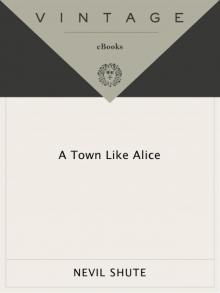 A Town Like Alice
A Town Like Alice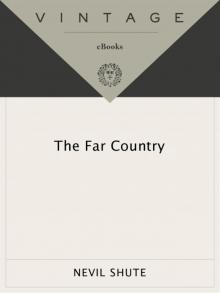 The Far Country
The Far Country Pied Piper
Pied Piper Round the Bend
Round the Bend An Old Captivity
An Old Captivity Mysterious Aviator
Mysterious Aviator The Breaking Wave
The Breaking Wave Marazan
Marazan Lonely Road
Lonely Road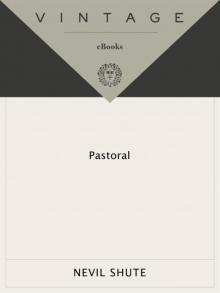 Pastoral
Pastoral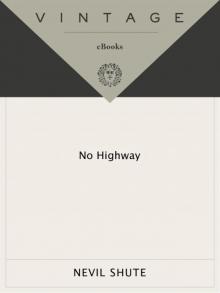 No Highway
No Highway Stephen Morris and Pilotage
Stephen Morris and Pilotage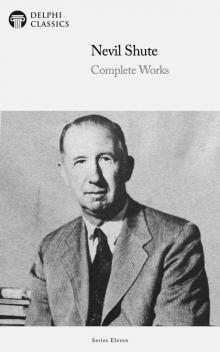 Complete Works of Nevil Shute
Complete Works of Nevil Shute Most Secret
Most Secret Beyond the Black Stump
Beyond the Black Stump The Rainbow and the Rose
The Rainbow and the Rose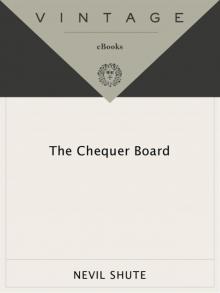 The Chequer Board
The Chequer Board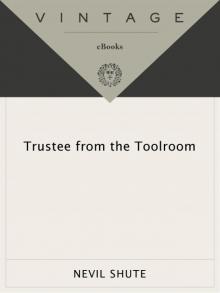 Trustee From the Toolroom
Trustee From the Toolroom Ordeal
Ordeal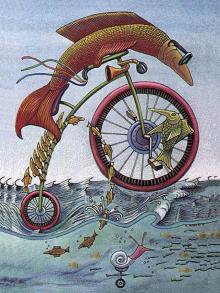 Stephen Morris
Stephen Morris